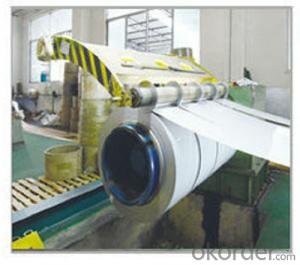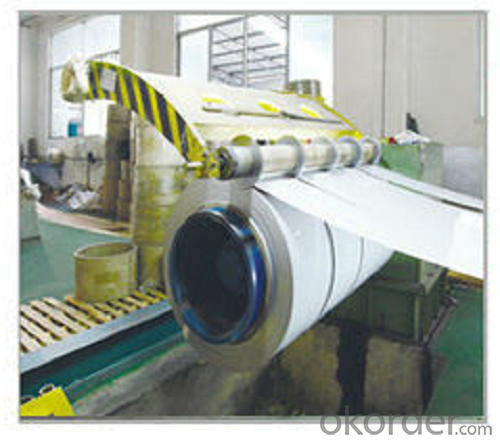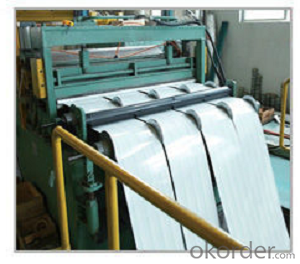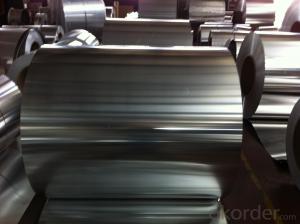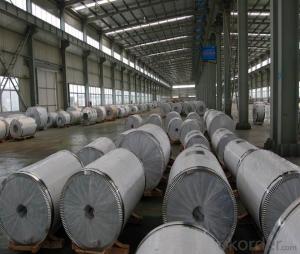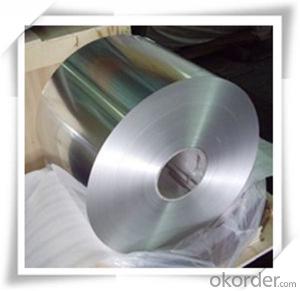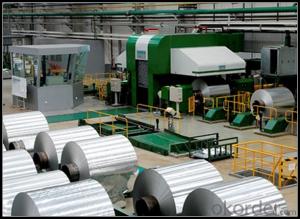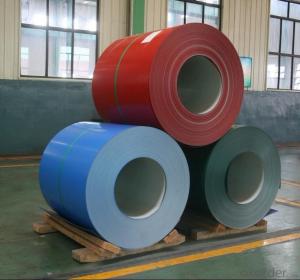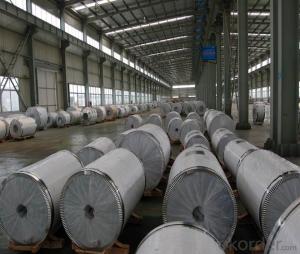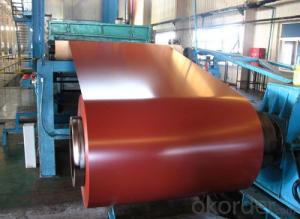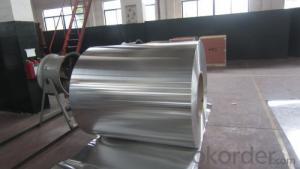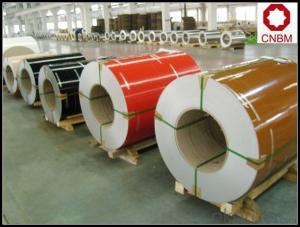Decorative Aluminum Panel Gutter Color Coated Aluminum Coil - Aluminum Coil Florida
- Loading Port:
- China main port
- Payment Terms:
- TT OR LC
- Min Order Qty:
- 10 m.t.
- Supply Capability:
- 1000 m.t./month
OKorder Service Pledge
OKorder Financial Service
You Might Also Like
Specification
Description of Aluminium Coil
01)Material: aluminum alloy A1100, A3003, A3005, A3105
02)Aluminum thickness:0.20-1.20mm
03)Max coil width: 1600mm(standard 1240mm)
04)Coil's standard diameter:1200mm, Interior diameter: 405mm,505mm, etc.
05) weight: 0.5-3.0T/coil or by buyer's option
06) Surface treatment: PE or PVDF coating
07) Color: solid, metallic, glossy, matte, wooden grain, marble stone,etc.
08) Dried and baked: oven baked at 450 degree F
09) Coating thickness: PVDF-25 micron, PE-18 micron
10) Coating hardness: (pencil hardness) HB
11) Coating adhesive: no lower than first grade
12) Impact resistance: no cracking and peeling(50kg/cm, ASTMD-2794:1993)
13)Flexibility(T-bend):2T or by your option
14) MEK resistance: more than 100
15)Outer packing: wooden plate, covering with craft paper and film, Eye to Sky or wall to Sky packing.
Interior applications:wall cladding, ceilings, bathrooms, kitchens and balconies, shutters, doors...
Exterior applications: wall cladding, facades, roofing, canopies, tunnels,column covers , renovations...
Advertisement and market applications: display platforms, signboards, fascia, shop fronts...
The Main Features of Aluminium Coil:
High quality with competive prices.
Wide product range of choice.
We are specific manufacture and control.
The Images of Aluminium Coil:
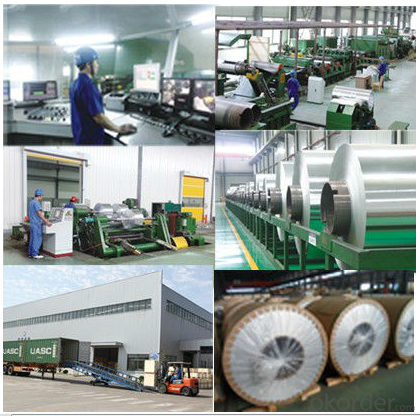
FAQ:
1. Minimum Order Quantity? MOQ is 25 tons, your quantity is ok, the aluminium foil sample is available. |
2. What kind of terms of payment? T/T, L/C,D/A,D/P,Western Union are available. |
3. What grams of the product can you offer? Our products can be customized according to your requirment |
4.Can you do Customization & Reproduction if I provide a photo? Yes, we do Customization & Reproduction service, please check the details and sample above. You need to send the pictures to our email, tell us the specification you want, then we will quote you exact price. We will take photos for you check. |
5. Does the packaging safe and arrive in good conditions? Yes, Safe Packing guarrantee, all the products will arrive your door under good conditions. We response to problem of shipping if there unfortunately is. |
6. How long does it usually take to deliver the product? We'll make the shipment to you immediately. It will take about 18 to 40 days arrive worldwide. Accurate delivery time depends on the specific quantity |
7.Is drop shipping abailable? Yes, it is, we can send to worldwide. |
- Q: What is the corrosion resistance of aluminum coils in saltwater environments?
- Aluminum coils have excellent corrosion resistance in saltwater environments. This is due to the formation of a protective oxide layer on the surface of the aluminum, which acts as a barrier against corrosion. This oxide layer prevents the saltwater from coming into direct contact with the aluminum, effectively reducing the risk of corrosion. Additionally, aluminum is inherently resistant to saltwater corrosion because it is a relatively inert metal. As a result, aluminum coils are commonly used in various marine applications, such as boat hulls, offshore structures, and saltwater cooling systems. However, it is important to note that prolonged exposure to saltwater can still result in some level of corrosion over time. Regular maintenance and appropriate protective coatings can help enhance the longevity and performance of aluminum coils in saltwater environments.
- Q: what is aircraft grade aluminum?
- Aircraft grade Aluminum is made to be very durable and strong, also Aluminum does not rust.
- Q: I was wondering if you could mold clay into a sphere then fill it with aluminum. Then put it over a fire and wait until the aluminum melts then put it in a freezer and it would come out as a sturdy, aluminum sphere. Thanks!
- Do not try this at home! Seriously, this is exactly the kind of process that is used for casting metals. However, you need to have very strong molds with no cracks in them. Also, aluminum presents special problems. Solid aluminum does not corrode the way iron does, because it very quickly forms a protective tough layer of aluminum oxide. But molten aluminum can catch fire, with devastating consequences.
- Q: Can aluminum coils be anodized?
- Yes, aluminum coils can be anodized. Anodizing is a process of enhancing the natural oxide layer on the surface of aluminum to create a more durable and corrosion-resistant coating.
- Q: show step by step
- First write out the formula reaction: 4Al + 3O2 --- 2Al2O3 Next, find the number of moles of oxygen gas needed to oxidize 3.42 g of aluminium completely. From the cchemical equation above, 3 mol of oxygen is used to oxidize completely 4 mol of aluminium. Calculate the no. of moles of aluminium used: no. of moles of aluminium used = 3.42 g / molar mass of Al = 3.42 g / 26.98 g mol^-1 = 0.127 mol Use the mole ratio concept to find the no. of moles of oxygen required: no. of moles of oxygen required : no. of moles of aluminium used = 3 : 4 no. of moles of oxygen required / 0.127 = 3 / 4 no. of moles of oxygen required = (3 / 4)(0.127) = 0.095 mol Next, use the gas equation PV = nRT [P: Pressure of gas in Pa; V: Volume of gas in m^3; n: no. of moles; R, gas constant, 8.314 J mol^-1 K^-1; T, Temperature of gas in K] -Convert 0.975 atm to Pa: 0.975 atm = (0.975 x 101325) Pa = 98791.875 Pa -Convert 25 oC to K: 25 oC = (25 + 273) K = 298 K -Substitute into the equation PV = nRT and solve it: (98791.875)(V) = (0.095)(8.31)(298) (98791.875)(V) = 235.2561 V = 235.2561 / 98791.875 = 0.002381 m^3 = (0.002381 x 10^3) L = 2.381 L
- Q: Its currently 3 AM so i can't check, but my question is:does aluminum rust slower/faster than other metals? I've basically had this bike for about 6 years, but only rid it once. Its been sitting in my backyard under a roof (safe from rain) for 6+ years. Is it safe to ride it? Also, bonus question: Does having a bike on campus make life 10x easier?
- Simple all alloy including aluminium turns to talcum powder which left will go black this is when the metal is oxidising. If the black is visible then scrap anything with it on. Have rescued many old bikes so things such as cables, tyres, tubes and your chain should be replaced as these usually suffer, if you are lucky these might still work. The chain will often freeze into a memory so won't turn, if not oiled may need hacksawed off. Most old bikes will reawaken with a few new or old replacement parts, also if will start to loosen with use so check it plus the bike will be desperately dry so to avoid component failure throw as much lubricant at it till it runs out and rejects it. The bike should only be sleeping so once wakened and sorted it will be as safe as you left it, though do check your brake blocks as these can split and perish. Steel parts can be replaced with alloy or treated with Kurust which gives rust a modern black component look. Have just woken a twenty five year old bike, once rebuilt it runs like a new bike plus is now safe as it has had various items modernised, something recommended for older bikes.
- Q: What specific cleaning procedures should be followed for aluminum coils post-usage to ensure their longevity and functionality?
- <p>After using aluminum coils, it's important to clean them properly to maintain their performance and longevity. Typically, a mild detergent and warm water solution can be used to gently clean the coils. Avoid abrasive materials or harsh chemicals that could scratch the surface. Rinse thoroughly to remove all detergent residues. For stubborn residues, a soft cloth or sponge can be used. It's also crucial to dry the coils completely to prevent corrosion. Regular inspection and maintenance, including cleaning, will help extend the life of aluminum coils.</p>
- Q: How are aluminum coils cut to length?
- Aluminum coils are typically cut to length using specialized machinery such as slitters or cut-to-length lines. These machines use sharp circular blades or shearing mechanisms to accurately and precisely cut the coils into desired lengths. The process involves unwinding the coil, passing it through the cutting mechanism, and then rewinding the cut pieces.
- Q: What are the fire-resistant properties of aluminum coils?
- Due to its inherent characteristics as a metal, aluminum exhibits excellent fire-resistant qualities when formed into coils. With a melting point of 660 degrees Celsius (1220 degrees Fahrenheit), aluminum can endure high temperatures without melting, thereby making aluminum coils resistant to fire hazards. Furthermore, unlike certain other metals, aluminum does not produce flammable gases when exposed to fire. This non-combustible attribute prevents the fire from spreading and minimizes the potential for fire-related damages. Additionally, due to its low thermal conductivity, aluminum does not efficiently conduct heat. Consequently, aluminum coils do not facilitate the transfer of heat from one area to another, which aids in containing and controlling the fire's spread. Moreover, aluminum coils frequently undergo a protective coating process to enhance their fire resistance. These coatings, composed of materials like polyvinylidene fluoride (PVDF) or polyester, create an additional barrier against fire and heat. Engineered to withstand extreme temperatures while maintaining their integrity, these coatings further bolster the fire-resistant qualities of aluminum coils. In summary, aluminum coils possess exceptional fire-resistant characteristics owing to their high melting point, non-combustible nature, low thermal conductivity, and protective coatings. These attributes make aluminum coils a dependable choice for applications where fire safety is paramount, such as in building construction, electrical wiring, and transportation industries.
- Q: 94 f150. have the stock wheels which are weathered and dull. whats a good way to bring the shine back? some of the original coating is there ,most is gone. tried mothers aluminum wheel polish,does nothing. is it wise to use a wire wheel in a drill to get down to just the aluminum? the wheels are those with the center plastic cap with holes around the outer edge.thanks for any info
- I am not sure if you can sand them down an put a clear coat on them? I can say this is why you see older vehicles with plasti-dip coatings, to cover up the dings, curb rash and peeling clear coat, and the cost is lower than replacement. List your city and state. In my area there is wheel specialty shop that does tig welding repairs and will do a factory refinish. Look for one of those places. Or buy new rims and sell the old ones online.
Send your message to us
Decorative Aluminum Panel Gutter Color Coated Aluminum Coil - Aluminum Coil Florida
- Loading Port:
- China main port
- Payment Terms:
- TT OR LC
- Min Order Qty:
- 10 m.t.
- Supply Capability:
- 1000 m.t./month
OKorder Service Pledge
OKorder Financial Service
Similar products
Hot products
Hot Searches
Related keywords
